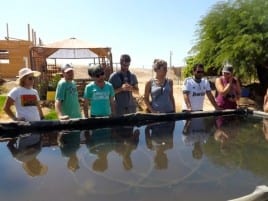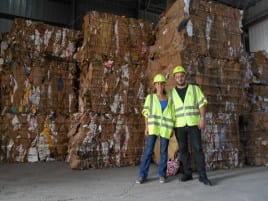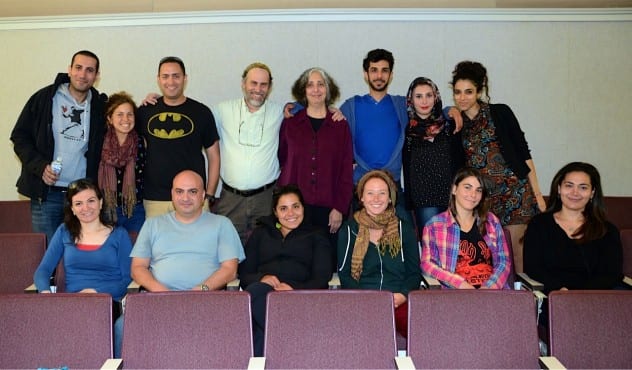Shana Tova and Eid Mabrouk!
In a joint interview on Israel Radio earlier this week, Sheikh Abdullah Nimar Darwish, founder of the Islamic Movement, and David Lau, the Chief Ashkenazi Rabbi of Israel stated:
“We will announce that all religious leaders declare peace between the two religions and two nations, and will call on politicians to hasten the peace process. Let’s make peace together, and organize a religious march in Tel Aviv or Kfar Kassem with the message that there should be quiet and an end to bloodshed, enough with the destruction, enough with the killing, enough with the hate.” Sheikh Darwish said.
Rabbi Lau added, “There’s no permission from God and there is no justification for harming people’s lives. I would be glad to meet with fellow religious leaders and spread this message.”
Read more: Chief Rabbi, Muslim leader in joint call to end violence | The Times of Israel http://www.timesofisrael.com/chief-rabbi-muslim-leader-call-to-end-violence/#ixzz3FPmPQQ5V
I wish that the Jewish and Moslem holidays overlapped every year. This year in particular seemed to highlight that which we have in common, as opposed to what makes us different. Kibbutz Ketura is especially blessed to not only host Jewish Israelis who seek refuge from the crowded center of the country for the quiet pristine Arava desert in order to celebrate the high holidays or Sukkot, the festival of booths, but the Keren Kolot guest house on Ketura also hosts Moslem Israelis who seek that same quiet pristine desert in order to celebrate Eid Al Adha, the festival of sacrifice. As Moslems and Jews celebrate their different religious traditions together by relaxing in the kibbutz swimming pool or enjoying a breathtaking sunset over the Arava valley, we once again get a glimpse of what the Middle East should look like.
This month’s blog gives you a peek at the new students who arrived in the beginning of the month as well as the activities of the staff and our alumni. Enjoy and Happy Holidays! David Lehrer
New Students Arrival
The Arava Institute is excited to welcome a new cohort of students for the Fall 2014 semester! Nineteen students and three new interns arrived in the first week of September from Israel, the West 
Classes are now in full swing, and students are engaged on a wide range of topics from archaeology to ecology to environmental law. Interns are working in the Center for Trans-boundary Water Management and the Center for Hyper-Arid Socio-Ecology. The Peace Building and Environmental Leadership Seminar (PELS) is also underway. Outside of class, students have been paired with kibbutz host families in order to connect them with the community beyond the Institute. With regular bonfires, hikes in the nearby desert, and a number of other extracurricular activities, this semester is off to a great start and students and faculty look forward to the next several months of learning, dialogue and community building.
On September 3rd, 22 staff members, including research interns and Program Associates, embarked on a day-long educational and social outing. The first stop was at Neot Hovav, an industrial park which hosts many of Israel’s major chemical industries as well as Israel’s main station for toxic waste care and disposal. After new management of the Regional Council was put into place, Neot Hovav revamped their chemical regulatory system in the park and the toxic waste disposal processes to meet international and Israeli environmental standards. Neot Hovav approached the Arava Institute to participate in a regional conference (to include Israels neighbors) on environmental chemical industrial standards and toxic waste disposal . The staff and interns visited the site to tour the new changes before the conference.
The three-hour visit began with a multimedia presentation, a meeting with the head of the Neot Hovav Industrial Park’s Regional Council and was followed by a bus ride around the area to see their new and improved processes for landfills and toxic waste disposal. As this was not the first time that a delegation from the Arava Institute had visited Neot Hovav (previously known as Ramat Hovev) many of the staff were impressed by the improvements in regulations, oversight, technology and a general shift in the culture from business as usual to sustainability and environmental protection.
The group was then joined by Dr. Shmuel Brenner and Yair Teller for lunch at a restaurant in Be’er Sheva. In the afternoon, the group continued on to a Bedouin village, Um Battin to visit Insanabal (‘stalk of grain’ in Arabic), an elementary school which houses two Arava Institute projects for bio-gas and grey water treatment. The group met with the school’s principal Muhamad Abu-Kaf, who is interested in bringing environmental education to the students. The staff were pleased to have an opportunity to see the Institute’s projects firsthand. Overall, the trip was a success and a chance to spend time together outside of the office before the start of the new semester the following week.
Submitted by Melanie Nakashian
Bennington Alumni Program
The Center for the Advancement of Public Action (CAPA) of Bennington College in Vermont held a 10-day leadership advancement program from September 11th to 21st. The program brought together young Middle Eastern leaders from Israel, Jordan, and Palestine who are working on developing projects related to environmental issues in their home countries.
The participants were twelve Arava Institute Alumni from different years, ranging from the classes of 2003 to 2014. CAPA provided the space for them to engage with Bennington faculty members for advisory and experience exchange. During the program, the participants were guided through workshops teaching advanced skills, such as negotiation and strategic planning.
During the program, time was set aside for a public forum where the participants presented on the topic of Climate Change: Challenges and Opportunities in Conflicted Areas. A session was also held with high school students from a Conflict Resolution course at Burr and Burton Academy, where the students had the chance to ask questions about the Arab-Iraeli conflict.
Organized and directed by Rabbi Michael Cohen and Susan Sgorbati in the beautiful, green, and peaceful campus of Bennington college, the leadership advancement program was a great success. The guidance and open discussion Rabbi Michael and Susan Sgorbati provided fostered a dynamic program that was the first of its kind. Additionally, the inclusion of Arava Institute alumni contributed to the success of the program. Shared experiences from the Institute, and the program at Bennington, gave them practical knowledge and skills to take forward to their environmental and community development in the future.
Hagar & Asem at Keeping Chicago Beautiful
Alumni and former Arava Institute interns, Hagar Ben Shlomo (from Israel) and Asem Magableh (from Jordan) arrived in Chicago late August to intern with the Keep Chicago Beautiful organization, an affiliate of the nonprofit Keep America Beautiful. As part of the internship, they visited with Keep Chicago Beautiful board members and visited a waste management company, a recycling factory, an 
Hagar and Asem describe the visits as fascinating and have offered them a great opportunity to familiarize themselves with the natural challenges in an environment so different than the Middle East. One of the most interesting places they have visited was the Water Reclamation office, which mainly deals with the management of drainage. It runs the world’s largest water treatment facility that reclaims an enormous amount of water around the Chicago area. Chicago is currently dealing with the issue of too much water run-off; which is then overwhelming the drainage system and flowing into Lake Michigan, taking contamination along with it.
Coming from the Middle East, it is a different experience for the two of them to get to know a place that suffers from over-precipitation.
Submitted by Hagar Ben Shlomo
Goodbye to Natasha
Natasha Westheimer joined the Arava Institute a little over a year ago as an intern in the Center for Trans-boundary Water Management. Her work focused on a USAID Conflict Management and Mitigation project with a goal of reducing wastewater pollution and increasing water supply to 
In October, Natasha will be leaving the Arava Institute to take up a position at Friends of the Earth Middle East, in Tel Aviv. Her duties will include grant writing and oversight assistance for the planning and implementation of the three Friends of the Earth Middle East regional offices in Bethlehem, Amman, and Tel Aviv. The entire Arava Institute community is sad to see her go and incredibly excited to hear about the great work she will continue to do. The staff and students of the Institute wish Natasha the best of luck and we hope to see her again soon.
Submitted by Kate Cohen


